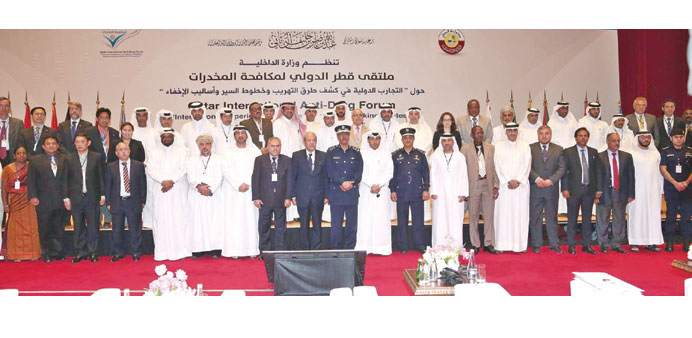The two-day Qatar International Anti-Drug Forum organised by the Ministry of Interior, has called for the establishment of an early warning observatory to combat the new trends in the field of drugs at the regional and Arab levels.
Lt Col Ibrahim al-Sameeh, secretary, Permanent Committee for Drugs and Alcohol Affairs (PCDAA) presented the recommendations at the end of the forum that was concluded yesterday.
Other recommendations included the importance of promoting comprehensive preventive education as one of the pillars of the balanced approach between supply and demand in the area of drugs.
The forum also called for the development of the technical, human and technological capabilities and the inclusion of anti-drug provisions criminalising drug promotion through the Internet.
Experts also asked to adopt regulatory mechanisms to enhance control and surveillance over the movement of the trading of chemical precursors and urged for bilateral and multilateral agreements in the field of fight against drugs.
Director General of public security and the chairman of the Permanent Committee for Drug and Alcohol Affairs, Staff Maj Gen Saad bin Jassim al-Khulaifi, heads and members of the participating delegations and high level officers from the Ministry of Interior attended the closing ceremony.
The global anti-drug forum called for the adoption of a media code of conduct that will support the efforts spent in the field of drug prevention and emphasised the need to strengthen the role of community participation within the legal and security mechanisms in the fight against drug.
The first session of the second day of the Forum chaired by Brig Eisa Aamal Qaqish, the director of Arab office for drug prevention discussed the subject titled “Methods of Trafficking”.
The paper presented by Capt Mohamed Abdullah al-Khatir, head of the studies and the international affairs section at the Drug Enforcement Department of the Ministry of Interior, Qatar talked about the types of drugs trafficked through Qatar and the experience of the Department in fighting drug. He said that there are no cases of drug trafficking through sea borders were reported because of the coordination with coasts and borders security department.
Claire Williams, who works in national crime field in the UK and as a Liaison Officer with the Gulf Co-operation Council (GCC), said that a large part of the success that has been achieved in the fight against drugs is due to the existing co-operation at the international level.
She observed that the biggest threat are the heroin and cocaine as well as cannabis.
Psychotropic substances have become emerging drugs since 2009, as they have become an urgent problem in youth concerts, she added.

The particpants at the forum.
